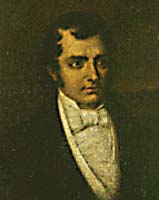Juan José Castelli
Juan José Castelli (born July 19, 1764 in Buenos Aires , † October 12, 1812 ) was an Argentine politician who took part in the May Revolution of 1810, which led to the independence of Argentina.
Castelli attended the Colegio Real de San Carlos and the Colegio Monserrat in Córdoba . He later worked as a lawyer at the University of Charcas . He was the cousin of Manuel Belgrano , who gave him a post in the public administration of the viceroyalty of the Río de la Plata .
Together with his cousin Nicolás Rodríguez Peña and Hipólito Vieytes , he was one of the first revolutionaries to take over a government. He was ordered to abdicate to Viceroy Baltasar de Cisneros . His long and brilliant speech on May 22, 1810 in the Cabildo , the seat of government in Buenos Aires, made him known as the spokesman for the revolution.
Castelli was appointed spokesman for the Primera Junta, the first government after the revolution, and sent to Cordoba to end the counter-revolution of Santiago de Liniers . He was successful and ordered the execution of Liniers and his followers. He later headed the establishment of a revolutionary government in Alto Perú , today's Bolivia , with the aim of liberating the indigenous population and African slaves.
In 1811, Castelli made a truce with the Spanish in Alto Perú , but was betrayed and the Northern Army surprised and captured. As a result, Argentina suffered a major defeat in the Battle of Huaqui on June 20, 1811 . When Castelli returned to Buenos Aires, he was imprisoned by the First Triumvirate as the cause of the shameful outcome of the battle.
Ironically, the "spokesman for the revolution" died on October 12, 1812 of tongue cancer.
| personal data | |
|---|---|
| SURNAME | Castelli, Juan José |
| BRIEF DESCRIPTION | Argentine politician |
| DATE OF BIRTH | July 19, 1764 |
| PLACE OF BIRTH | Buenos Aires |
| DATE OF DEATH | October 12, 1812 |
